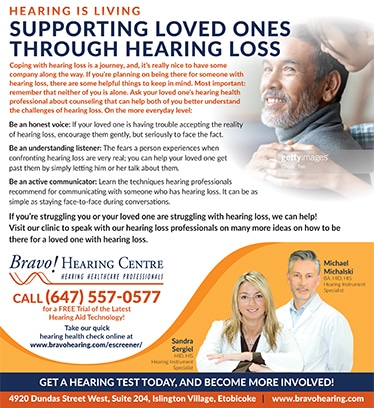Supporting Your Loved Ones Through Hearing Loss
Coping with hearing loss is a journey, and, it’s always nice to have company along the way. If you want to be there for someone you care about with hearing loss, there are some helpful things to keep in mind. The most important is to remember that neither of you are alone. Be sure to ask your loved one’s hearing health professional about counselling that can help both of you to better understand the challenges of hearing loss.
While offering your support and helping them when they need it are excellent ways to show you care, there are also a few things you can do every day to remind them that you are there for them. These include:
 Being an Honest Voice – If your loved one is having trouble accepting the reality of hearing loss, encourage them gently, but seriously to face the fact. Be kind and tactful, but also be sure you address the seriousness of the issue.
Being an Honest Voice – If your loved one is having trouble accepting the reality of hearing loss, encourage them gently, but seriously to face the fact. Be kind and tactful, but also be sure you address the seriousness of the issue.- Being an Understanding Listener – The fears a person experiences when confronting hearing loss are very real, and can make them feel uncomfortable, nervous and alone. You can help your loved one work through them by simply letting him or her talk about them openly without giving your judgment.
- Being an Active Communicator – Learn the techniques hearing professionals recommend for communicating with someone who has hearing loss. It can be as simple as staying face-to-face during conversations or not blocking your mouth when you speak.
If you or your loved one are struggling with hearing loss, we can help! The professionals at Bravo Hearing Centre in Etobicoke know how difficult hearing loss can be for you and those that care for you, and invite you to contact us should you require any information or support. We aim to provide the best recommendations for your hearing health. Our team is committed to providing services and support based on each patient’s needs.
Visit our clinic or call us at 647-694-4626 to speak with our hearing loss professionals about many more ideas on how to be there for a loved one with hearing loss.

